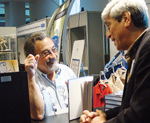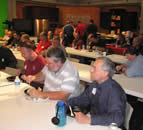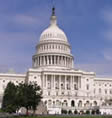News & Headlines
FCC Field Office Closures: A Compromise Solution
June 12, 2015
In April, news of an FCC plan to close a majority of its field offices and retire the affected staff became widely circulated. This caused quite a stir among many groups, including broadcasters. In response, a Congressional Subcommittee hearing was planned to discuss the matter on April 11, and SBE General Counsel Chris Imlay was scheduled to testify on the SBE's behalf. However, about June 9, 2015, the FCC and the Subcommittee reached an agreement, and the hearing was cancelled. The results of the compromise can partially be attributed to SBE efforts. Like most compromises, the deal struck is not completely satisfactory to the SBE Board of Directors, but it represents a far better outcome than what was being proposed initially and the SBE is grateful for chairman of the House Subcommittee on Communications and Technology Rep. Greg Walden's leadership in helping broadcasters.
Under the compromise plan, field offices or resident staff will be maintained in New York; Columbia, MD, Chicago; Atlanta; Miami; Dallas; Los Angeles; San Francisco; Portland, OR; Denver; Boston; New Orleans; Honolulu; Anchorage and San Juan. The FCC will store vans and equipment in Kansas City; Salt Lake City; Phoenix; Seattle; and Billings, MT. Staff will visit Kansas City once a month for a few days to work from there. The FCC will deploy two "tiger teams" to address urgent RF enforcement issues quickly instead of just one. The teams will be based in Columbia, MD; and Denver. The FCC will develop a modified procedure for handling RF interference complaints and will increase enforcement efforts on pirate radio stations, starting immediately.
It remains to be seen how effective the new procedures and structure will be. There are still some very good career engineers in the field offices that will be closed whose skills and knowledge should not have been lost. This is a shame. The FCC process completely lacked transparency and public responsiveness. There were far better methods of saving Enforcement Bureau money than the means recommended by FCC's invisible contractor's report, and the SBE and the broadcast industry were denied the opportunity to present them and have them considered in an open forum. The SBE intends to continue the dialog with the FCC about needed improvements in RF spectrum enforcement efforts. But the society is pleased that its actions have contributed positively to a better outcome than that originally proposed.
Background
The SBE Board of Directors was briefed at the 2015 NAB Show in April about the FCC's proposal to shutter 16 of its 24 field offices and to dismiss half of the staff in the field. The SBE was made aware of the reorganization plan via a leaked internal memo dated March 10, 2015, from one of the field offices outlining the proposal of the FCC Managing Director and the Enforcement Bureau Chief. That memo was promptly delivered by SBE General Counsel Chris Imlay to the House Subcommittee on Communications and Technology.
The SBE Board directed that its concerns about the plan be presented to the FCC Commissioners and to Congress. So, on May 11, SBE President Joe Snelson wrote to FCC Chairman Wheeler (copies of which were delivered to all Commissioners and Congressman Greg Walden, chairman of the House Subcommittee on Communications and Technology. The letter can be viewed on the SBE website.
After the SBE letter was widely circulated, Representative Walden and his Subcommittee staff heard directly from the SBE, the NAB, ARRL, the National Public Safety Telecommunications Council (NPSTC) and others about this issue. Walden called a hearing about it, scheduled for June 11. The SBE was promised an opportunity to testify before the House Subcommittee.
The SBE Board of Directors was most concerned about the complete lack of transparency in the development of the proposal that resulted from a contractor's recommendation. Although there have historically been very positive relationships between broadcast engineers and the Commission's field office technical personnel, the SBE was sensitive to the fact that Commission policies had caused FCC field offices to perform tasks such as tower inspections and public file inspections at broadcast stations: tasks that detracted from the fundamental obligation of the field offices to act quickly to resolve interference problems, and to police the radio spectrum.
The SBE letter (referenced above) made several points:
■ Historically, broadcast engineers have had a close, positive and constructive working relationship with those field offices and with the knowledgeable staff that is responsive to the interference issues brought to them.
■ The field offices are already operating at well below efficient levels due to the longer term effects of hiring freezes and attrition in the offices due to retirement of experienced staff.
■ The proposed cuts would have a substantially adverse effect on compliance in virtually all radio services.
■ The plan was developed by an FCC contractor without the slightest bit of transparency and without any contact at all with SBE. It should be revisited following an opportunity for input by the stakeholders, including SBE.
■ The field offices can make better use of the limited time and resources available to them. They should be targeting spectrum polluters, such as power utilities with noisy power lines, unauthorized RF lighting devices (most especially RF lighting ballasts that preclude AM broadcast reception throughout entire communities at once), and pirate broadcasting.
It is well-understood by the SBE and other industry representatives that the FCC will never have enough field office staff to adequately police the radio spectrum in all States and territories. But the visibility of FCC staff that results from a local or regional presence, coupled with quick response to rule violations in all radio services creates a strong deterrence value and promotes rule compliance. Conversely, where FCC enforcement is neither visible nor timely, rule violations continue and others are encouraged to emulate the behavior. The SBE made this point to the FCC staff and to the Commissioners' offices, and the SBE's General Counsel visited the Commissioners' offices to make the arguments directly.









